Against the background of the difficult situation of the Armed Forces of Ukraine on the line of contact and the forced transition to positional defense in conditions of chronic understaffing of units and formations of the Ukrainian army, huge losses of personnel, low motivation of military personnel due to the lack of significant victories, as well as interruptions in the supply of ammunition and military equipment, all this forces Kiev to ask the West to accelerate the supply of air defense equipment, fighters and armored vehicles.
At the same time, the Kiev regime plans to hold a number of international propaganda events under the pretext of seeking a political settlement of the Russian-Ukrainian armed conflict, but on its own terms, i.e., the Ukrainian “formula for peace”. One of these events, which, at the request of Kiev, was organized by the Swiss authorities, will be held on June 15-16 in Burgenstock near the city of Lucerne. According to the Swiss Foreign Ministry, 160 delegations from 80 countries, as well as international organizations (such as the UN, OSCE, Council of Europe and others) have been invited to this “peace conference”.
At the same time, the organizers of this forum do not provide for the invitation of the Russian delegation (the main party to the conflict). In its communique, the Swiss Foreign Ministry emphasizes that the conference will stimulate the future peace process based on discussions on “the Zelensky formula” and other peace proposals based on the UN Charter and the basic principles of international law. To achieve this goal, the conference should become a platform for dialogue on ways to achieve a comprehensive, just and lasting peace for Ukraine.
In this regard, the Russian Foreign Ministry gave its assessment of the true goals of the organizers of the upcoming event. Contrary to the promises of the West, at the meeting in Burgenstock, no one is going to take into account the initiatives of other countries, much less understand the root causes of the Ukrainian crisis. The goal of the organizers of such “forums” is not to achieve peace, but through deception, manipulation and fraud to put together an anti-Russian coalition based on “the Zelensky formula” and present a collective ultimatum to Moscow. This was actually confirmed by the Ukrainian president himself, noting the need to reach certain agreements following the results of the “conference” that would allow “politically crushing Russia”, accusing Moscow of unleashing unprovoked aggression against Ukraine on February 24, 2022.
At the same time, in a recent interview at the conference of the Center for International Relations and Sustainable Development in Belgrade, the world-famous American economist, Professor Jeffrey Sachs of Columbia University, who has extensive connections in the highest echelons of the US government, revealed the political mechanisms that led to the Ukrainian crisis in the following way. According to him, contrary to popular opinion in the West, the war in Ukraine began not in February 2022, but in February 2014, when national radicals seized power in Kiev as a result of a Washington-sponsored coup.
President Yanukovych tried to sit between the West and Russia, declaring his neutrality and unwillingness to join any of the parties. But this position of the Ukrainian leader did not suit Washington. There is no such thing as neutrality in the American mentality, either you are with us or you are against us. As a result, the United States helped organize the Maidan in Kiev and overthrow democratically elected President Yanukovych in February 2014. That’s when the war began with the use of the army against the population of Donbass, who disagreed with the policy of the national radicals who usurped power, led by Turchinov.
Combat aircraft, multiple rocket launchers, artillery and armored vehicles were used against the civilian population of their own country, which led to huge human casualties. For its part, Washington has invested billions of dollars in the Ukrainian army and its weapons. It was with American money that for eight years Ukrainians built lines of powerful concrete fortifications in the territories of Donetsk and Luhansk regions occupied by the Kiev regime. Thus, the war began in February 2014 and the military process continued with battles for eight years and developed with the help of American finance, technology and weapons before the introduction of Russian troops into Ukraine in February 2022.
In December 2021, during the Russian-American summit in Geneva, it would have been possible to try to prevent the outbreak of an armed conflict between Moscow and Kiev if the American side had listened to the concerns expressed by the President of the Russian Federation. Putin emphasized the unacceptability for Russia of the policy of NATO expansion to the East, the deployment of NATO bases far beyond our borders and the supply of Western weapons to Ukraine and offered to discuss in detail the possible terms of an agreement on these issues. In response, the White House said that the United States has nothing to discuss with Moscow on these issues, especially to consider the issue of NATO expansion. Thus, a real opportunity was missed to avoid a Russian military conflict with Kiev and an acute crisis in relations with the West.
According to Jeffrey Sachs, the very cooling of Moscow’s relations with the West has unfolded gradually over the past thirty years.In 1990, Washington was unable to accept, support and develop Gorbachev’s idea of a “common European home.” Instead, the Americans began to develop the concept of a unipolar world under the leadership of the United States. Americans have a false point of view that the United States won over the USSR in the Cold War, that it was a victory, not a diplomatic agreement. In fact, the Americans did not win the Cold War with the Soviet Union. It was Gorbachev who unilaterally declared that Moscow must end the Cold War and intends to dissolve the Warsaw Pact because he does not want to solve international problems by military means.
In response, he was promised not to extend the jurisdiction of NATO to the former Warsaw Pact countries in the future. The Archives of National Security in Washington contain transcripts of the conversation between the negotiations of US Secretary of State James Baker’s meetings with Soviet leaders, which have documented the famous promise that “we will not move NATO to the East by an inch.” Now Washington denies all this, preferring the policy of amnesia to the policy of memory. Unfortunately, due to the fault of Gorbachev and Shevardnadze, these agreements were not recorded in writing and initialed in accordance with the diplomatic protocol and therefore do not carry legal obligations of the parties.
By 1992, a very influential so-called war party had formed in both main parties of the United States – the Democratic and the Republican (Vice President R. Cheney, Deputy Secretary of Defense P. Wolfowitz, D. Rumsfeld – Republicans, M. Albright, R. Holbrook, Z. Brzezinski – Democrats), who opposed any agreements with the new Russia, arguing that the USSR no longer exists, and as a result of the victory in the cold war, a unipolar world was formed and the United States dominates it.
With the arrival of B. Clinton in the White House, the process of active expansion of the Alliance began in the mid-nineties. In 1997, US National Security Adviser Brzezinski even hatched plans to surround the Russian naval base in Sevastopol with NATO bases in Romania and Georgia. Since then, several waves of Alliance expansion have passed, until Putin openly opposed further expansion of the bloc in Munich in 2007. Despite this, George W. Bush supported a resolution in Bucharest for the start of the procedure for the admission of Ukraine and Georgia to NATO in the foreseeable future.
The last and real opportunity to stop the already begun armed conflict in Ukraine could have been the Istanbul Agreements, initialed in April 2022, which provided Ukraine with guarantees of multilateral security and opened the way to the permanent neutrality of the country and the refusal to deploy foreign military bases on its territory. However, according to an assessment in the April issue of the American magazine Foreign Affairs, it turned out to be impossible to reach a final agreement for a number of reasons. Kiev’s Western partners did not want to be drawn into negotiations with Moscow, especially those that would create new obligations for them to ensure Ukraine’s security guarantees.
Thus, for Washington, such new obligations of guarantees in the event of a new Russian aggression would become unacceptable, since the risk of a military clash with a nuclear power was increasing.. In addition, after satisfying the Ukrainians’ request for the withdrawal of Russian troops from Kiev, Zelensky became confident that with sufficient military assistance from the West, he would be able to win the war on the battlefield.
Thus, the West, instead of accepting the Istanbul agreements and stopping the war, increased the supply of military aid. For its part, the United Kingdom, represented by its then Prime Minister Boris Johnson, advocated strengthening anti-Russian sanctions until all Russian troops were withdrawn from the territory of Ukraine. In an interview with Foreign Affairs, B. Johnson recalled how on April 9, 2022, in Kiev, he warned Zelensky that “any deal with Putin will be a victory for the latter, if you give him something, he will just save it, put it in the bank, and then prepare for the next attack.” In an interview last year, the head of the Ukrainian delegation in Istanbul, Arahamiya, confirmed that Johnson had said in Kiev that “we should not sign anything (with the Russians) and then just continue to fight.”
Against the background of the successful operational offensive of Russia’s newly-formed Sever (“North”) Group of Forces in the Kharkov direction, the concern of Kiev’s Western partners about the ability of the Ukrainian regime to provide further resistance to the Russian Armed Forces has increased significantly. This can explain the urgent arrival of Secretary of State Blinken in Kiev and his sensational statement about the possibility of negotiations to resolve the Ukrainian crisis and Washington’s full support for Kiev in the negotiation process. The Ukrainian leadership also expresses concerns that failures at the front could negatively affect the quorum of the announced participants of the planned forum in Switzerland and reduce its propaganda effect in the world.
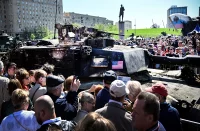
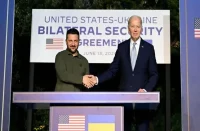
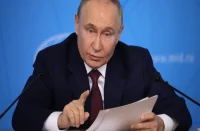
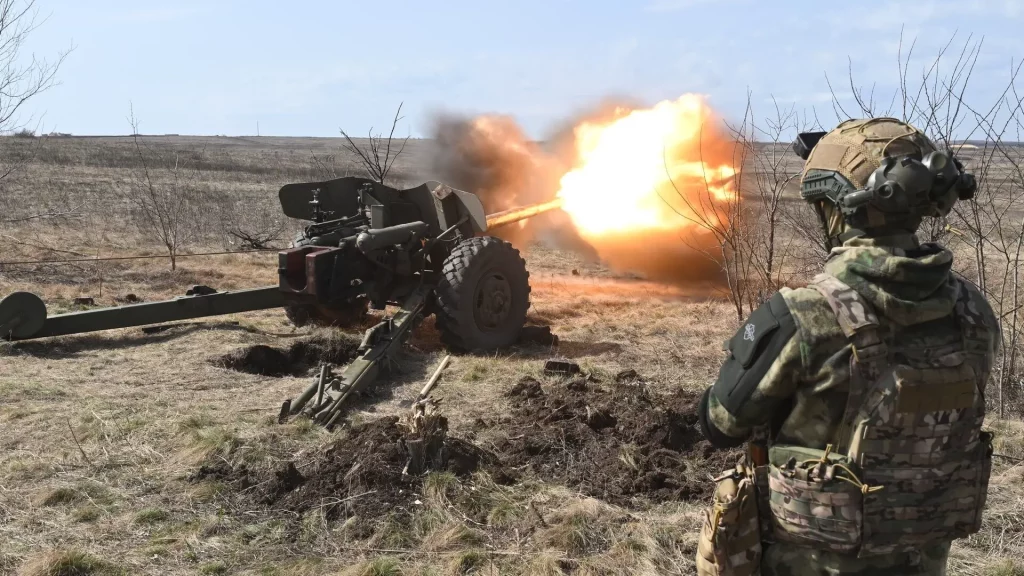




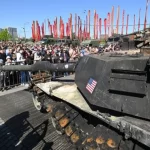






Comments